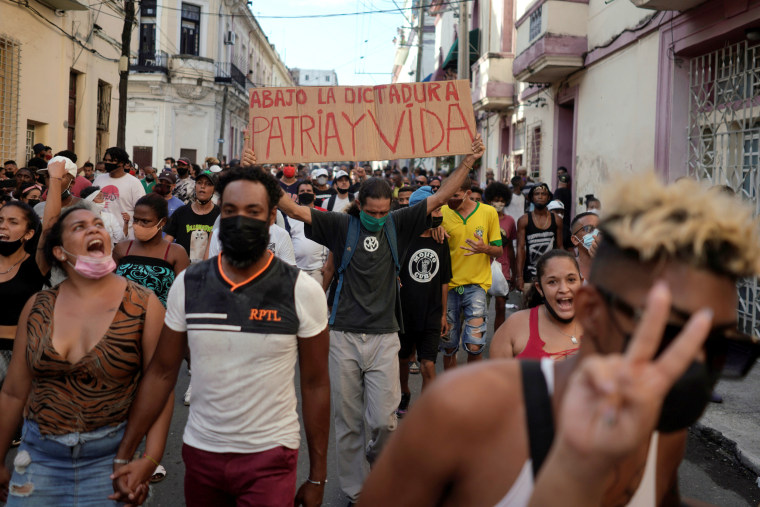WASHINGTON — President Joe Biden on Monday voiced support for the protesters in Cuba, a day after thousands of people took to the streets in historic anti-government demonstrations.
"We stand with the Cuban people and their clarion call for freedom and relief from the tragic grip of the pandemic and from the decades of repression and economic suffering to which they have been subjected by Cuba's authoritarian regime," Biden said in a statement.
"The United States calls on the Cuban regime to hear their people and serve their needs at this vital moment rather than enriching themselves," he added.
Cuba faces its worst economic crisis in decades in part due to the coronavirus pandemic, which brought tourism — one of the largest drivers of the island nation's economy — to a halt. Cubans have faced food and medicine shortages and have struggled to get basic supplies. The island nation has been under an economic embargo imposed by the United States in 1960.

The protests present a thorny political decision for the White House as some lawmakers have pushed Biden to reverse Trump administration policies and normalize relationships with Cuba, as former President Barack Obama had attempted before leaving office. However, others, have continued to call for taking a tough stance against Cuba.
The demonstrations sprung up as the Biden administration was already grappling with how to respond to the turmoil in Haiti following the assassination of President Jovenel Moïse.
Biden committed during his campaign for president to reverse the Trump-era policies, saying at the time that Trump's approach "has done nothing to advance democracy and human rights; on the contrary, the crackdown on Cubans by the regime has gotten worse under Trump, not better."
White House press secretary Jen Psaki said Monday that the administration was closely monitoring the protests but gave no indication that the president was considering a change in policy.
Wading into the delicate domestic politics of Cuba by Biden risks undermining the protests. Cuban politicians and the state-run media often discredit dissidents by saying that they are pushing the interests of the United States.
Cuban President Miguel Díaz-Canel said Monday that the U.S. embargo against Cuba was to blame for the protests, arguing that the embargo had contributed to power outages and limited access to food and medical supplies during the pandemic.
Psaki denied that U.S. sanctions led to the current economic situation in Cuba, telling reporters there were a number of exceptions that allowed medical supply and other humanitarian assistance to be sent to Cuba.
The protests Sunday were rare for Cuba, whose communist government has a reputation for quickly cracking down on dissent. Protests of that scale had not taken place in the country in decades.
"I don’t think we’ve seen anything like these protests in a long, long time if, quite frankly, ever," Biden said at a meeting at the White House later Monday.
Senior Department of State official Julie Chung on Sunday tweeted in support of the Cuban protesters, attributing their frustrations to "rising COVID cases/deaths & medicine shortages."
Sen. Marco Rubio, R-Fla., criticized Chung's assessment of the protests, tweeting that Cubans were "protesting 62 years of socialism, lies, tyranny & misery."
"Why is it so hard for [Biden] & the people in his administration to say that?," he wrote.
